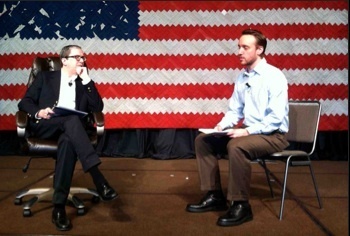The Supremes
Here’s how I fell in love with the Supreme Court: riding a Boston city bus, earbuds in, listening to the justices’ voices. As the court debated a Chicago loitering law—a law that allowed the police to arrest not only gang members but anyone with them for lingering with “no apparent purpose” in a public place—I stared out the window at the people passing on the street. It felt provocative to overlay a high-minded argument about society on top of society as it actually existed, and I wondered whether I would hear any of my world reflected back at me from the court. Then Justice David Souter spoke, forcefully. “I'm still bothered by the seemingly open-ended possibilities of determining what is or is not an apparent purpose,” he said. “Some people, for example, with nothing better to do like to sit and watch, or stand and watch, the cars go by. That’s a purpose.” I was hooked.
Here’s how you might fall in love with the Supreme Court: sitting in a dark theater, watching two actors facing one another in desk chairs on a minimally dressed stage, reenacting an oral argument. This is Arguendo, a new play from Elevator Repair Service, still being developed in workshop but presented in four early performances on May 17 and 18 at a sixty-seat black-box theater in Brooklyn. Elevator Repair Service is best known for Gatz, a theatrical endurance test in which F. Scott Fitzgerald’s The Great Gatsby is performed in its entirety over the course of six hours. Arguendo, only forty minutes long in its present incarnation, rewards a different kind of persistence. It challenges its audience to enter in the middle of a conversation—after written briefs are filed but before an opinion has been issued—ignorant of the law, of legal language, and of the justices. We are asked to ride out that ignorance with the promise that it will yield to wisdom and delight.
The Paris Review's Blog
- The Paris Review's profile
- 305 followers



 Read More »
Read More »
